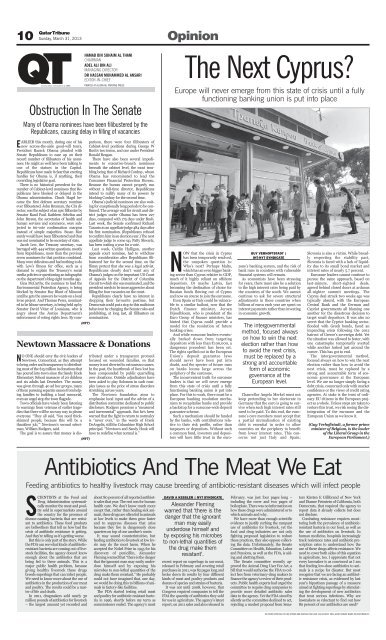Karzai hopeful of Taliban joining mainstream - Qatar Tribune
Karzai hopeful of Taliban joining mainstream - Qatar Tribune
Karzai hopeful of Taliban joining mainstream - Qatar Tribune
Create successful ePaper yourself
Turn your PDF publications into a flip-book with our unique Google optimized e-Paper software.
10 Sunday, March 31, 2013<br />
Opinion<br />
ESTABLISHED SEPTEMBER 3, 2006<br />
HAMAD BIN SUHAIM AL THANI<br />
CHAIRMAN<br />
ADEL ALI BIN ALI<br />
MANAGING DIRECTOR<br />
DR HASSAN MOHAMMED AL ANSARI<br />
EDITOR-IN-CHIEF<br />
PRINTED AT ALI BIN ALI PRINTING PRESS<br />
Obstruction In The Senate<br />
Many <strong>of</strong> Obama nominees have been filibustered by the<br />
Republicans, causing delay in filling <strong>of</strong> vacancies<br />
EARLIER this month, during one <strong>of</strong> his<br />
new across-the-aisle good-will tours,<br />
President Barack Obama pleaded with<br />
Senate Republicans to ease up on their<br />
record number <strong>of</strong> filibusters <strong>of</strong> his nominees.<br />
He might as well have been talking to<br />
one <strong>of</strong> the statues in the Capitol.<br />
Republicans have made it clear that erecting<br />
hurdles for Obama is, if anything, their<br />
overriding legislative goal.<br />
There is no historical precedent for the<br />
number <strong>of</strong> Cabinet-level nominees that Republicans<br />
have blocked or delayed in the<br />
Obama administration. Chuck Hagel became<br />
the first defence secretary nominee<br />
ever filibustered. John Brennan, the CIA director,<br />
was the subject <strong>of</strong> an epic filibuster by<br />
Senator Rand Paul. Kathleen Sebelius and<br />
John Bryson, the secretaries <strong>of</strong> health and<br />
human services and commerce, were subjected<br />
to 60-vote confirmation margins<br />
instead <strong>of</strong> simple majorities. Susan Rice<br />
surely would have been filibustered and thus<br />
was not nominated to be secretary <strong>of</strong> state.<br />
Jacob Lew, the Treasury secretary, was<br />
barraged with 444 written questions, mostly<br />
from Republicans, more than the previous<br />
seven nominees for that position combined.<br />
Many were ridiculous and had nothing to do<br />
with Lew’s fitness for <strong>of</strong>fice, such as a<br />
demand to explain the Treasury’s social<br />
media policies or questioning an infographic<br />
on the department’s blog eight months ago.<br />
Gina McCarthy, the nominee to lead the<br />
Environmental Protection Agency, is being<br />
blocked by Senator Roy Blunt <strong>of</strong> Missouri<br />
until he gets the answers he wants on a local<br />
levee project. And Thomas Perez, nominated<br />
to be labour secretary, is being held up by<br />
Senator David Vitter <strong>of</strong> Louisiana, who is<br />
angry about the Justice Department’s<br />
enforcement <strong>of</strong> voting rights laws. By comparison,<br />
there were four filibusters <strong>of</strong><br />
Cabinet-level positions during George W<br />
Bush’s two terms, and one under President<br />
Ronald Reagan.<br />
There have also been several impediments<br />
to executive-branch nominees<br />
beneath the cabinet level, the most troubling<br />
being that <strong>of</strong> Richard Cordray, whom<br />
Obama has renominated to lead the<br />
Consumer Financial Protection Bureau.<br />
Because the bureau cannot properly run<br />
without a full-time director, Republicans<br />
intend to nullify many <strong>of</strong> its powers by<br />
blocking Cordray for the second time.<br />
Obama’s judicial nominees are also waiting<br />
for exceptionally long periods to be confirmed.<br />
The average wait for circuit and district<br />
judges under Obama has been 227<br />
days, compared with 175 days under Bush.<br />
Last week, the Senate confirmed Richard<br />
Taranto as an appellate judge 484 days after<br />
his first nomination. (Republicans refused<br />
to confirm him in an election year.) The next<br />
appellate judge to come up, Patty Shwartz,<br />
has been waiting a year for a vote.<br />
Last week, Caitlin Halligan, another<br />
appeals court nominee, had to withdraw<br />
from consideration after Republicans filibustered<br />
her for the second time, on the<br />
flimsy pretext that she was a legal activist.<br />
Republicans clearly don’t want any <strong>of</strong><br />
Obama’s judges on the important US Court<br />
<strong>of</strong> Appeals for the District <strong>of</strong> Columbia<br />
Circuit to which she was nominated, and the<br />
president needs to be more aggressive about<br />
filling the four vacancies on the court.<br />
Republicans clearly have no interest in<br />
dropping their favourite pastime, but<br />
Democrats could put a stop to this malicious<br />
behaviour by changing the Senate rules and<br />
prohibiting, at long last, all filibusters on<br />
nominations.<br />
Newtown Massacre & Donations<br />
(NYT)<br />
(NYT)<br />
NO ONE should envy the civic leaders <strong>of</strong><br />
Newtown, Connecticut, as they attempt<br />
to bring order and transparency to distributing<br />
most <strong>of</strong> the $15 million in donations that<br />
has poured into town since the Sandy Hook<br />
Elementary School massacre <strong>of</strong> 20 children<br />
and six adults last December. The money<br />
was given through 40 ad hoc groups, many<br />
<strong>of</strong> them pursuing separate causes from helping<br />
families to building a local memorial,<br />
even an angel atop the town flagpole.<br />
Town <strong>of</strong>ficials have wisely been listening<br />
to warnings from veterans <strong>of</strong> earlier tragedies<br />
that there will be no easy way to please<br />
everyone. “They all said, ‘You need thickskinned<br />
people, because this will be a<br />
thankless job,”’ Newtown’s second selectman,<br />
William Rodgers, said.<br />
The goal is to assure that money is distributed<br />
under a transparent protocol<br />
focused on wounded families, so that<br />
money is not diverted to extraneous causes.<br />
In the past, the heartbreak <strong>of</strong> lives lost has<br />
been compounded by public quarrelling<br />
over donations. Outside adjudicators have<br />
been asked to play Solomon in such complex<br />
issues as the price <strong>of</strong> stress disorders<br />
stretching across years.<br />
The Newtown foundation aims to<br />
emphasise local input and the advice <strong>of</strong> a<br />
distribution committee dedicated to public<br />
disclosure. Rodgers promises a “measured<br />
and incremental” approach. But he’s been<br />
warned that the fight to return to normalcy<br />
is “never over,” in the words <strong>of</strong> Frank<br />
DeAngelis, still the Columbine High School<br />
principal. “Newtown and Sandy Hook will<br />
have to redefine what normal is.”<br />
The Next Cyprus?<br />
Europe will never emerge from this state <strong>of</strong> crisis until a fully<br />
functioning banking union is put into place<br />
GUY VERHOFTSTADT |<br />
IHT-NYT SYNDICATE<br />
NOW that the crisis in Cyprus<br />
has been temporarily resolved,<br />
the unspoken question is:<br />
Who’s next? Perhaps Malta,<br />
which has an even bigger banking<br />
sector than Cyprus relative to GDP,<br />
much <strong>of</strong> it highly reliant on <strong>of</strong>fshore<br />
depositors. Or maybe Latvia, fast<br />
becoming the destination <strong>of</strong> choice for<br />
Russian funds flowing out <strong>of</strong> Cyprus<br />
and now on course to join the eurozone.<br />
Even Spain or Italy could be vulnerable<br />
to a similar bailout, now that the<br />
Dutch finance minister, Jeroen<br />
Dijsselbloem, who is president <strong>of</strong> the<br />
Euro Group <strong>of</strong> finance ministers, has<br />
hinted that Cyprus could provide a<br />
model for the resolution <strong>of</strong> future<br />
banking crises.<br />
And while eurozone leaders eventually<br />
backed down from targeting<br />
depositors with less than €100,000, a<br />
dangerous precedent has been set.<br />
The rights spelled out in the European<br />
Union’s deposit guarantee laws<br />
should never have been put into<br />
doubt, and the spectre <strong>of</strong> future runs<br />
on banks looms large across the<br />
periphery <strong>of</strong> the eurozone.<br />
The inconvenient truth for eurozone<br />
leaders is that we will never emerge<br />
from this state <strong>of</strong> crisis until a fully<br />
functioning banking union is put into<br />
place. For this to work, there must be a<br />
European banking resolution mechanism<br />
to recapitalise banks and provide<br />
a backstop for a eurozone-wide deposit<br />
guarantee scheme.<br />
Such a mechanism should be funded<br />
by the banks, with contributions relative<br />
to their risk pr<strong>of</strong>ile, rather than<br />
taxpayers or depositors. Without such<br />
a common fund, investors and depositors<br />
will have little trust in the eurozone’s<br />
banking system, and the risk <strong>of</strong><br />
bank runs in countries with vulnerable<br />
financial systems will remain.<br />
As economists have been stressing<br />
for years, there must also be a solution<br />
to the high interest rates being paid by<br />
the countries <strong>of</strong> the south. We cannot<br />
continue to ask for severe structural<br />
adjustments in these countries when<br />
billions <strong>of</strong> euros each year are spent on<br />
interest payments rather than investing<br />
in economic growth.<br />
The intergovernmental<br />
method, focused always<br />
on how to win the next<br />
election rather than how<br />
to avoid the next crisis,<br />
must be replaced by a<br />
strong and accountable<br />
form <strong>of</strong> economic<br />
governance at the<br />
European level.<br />
Chancellor Angela Merkel must not<br />
keep pretending to her electorate in<br />
Germany that the euro is going to survive<br />
when such high interest rates still<br />
need to be paid. To this end, the eurozone’s<br />
core members must accept that<br />
a partial mutualisation <strong>of</strong> existing<br />
debt is essential in order to allow<br />
countries on the periphery to benefit<br />
from lower interest rates. This concerns<br />
not just Italy and Spain;<br />
Slovenia is also a victim. While broadly<br />
respecting the stability pact,<br />
Slovenia is faced with a lack <strong>of</strong> liquidity<br />
due to its small bond market and<br />
interest rates <strong>of</strong> nearly 5.7 percent.<br />
Eurozone leaders cannot continue to<br />
pursue the same approach, based on<br />
last-minute, short-sighted deals,<br />
agreed behind closed doors at arduous<br />
all-nighter summit meetings. The<br />
Cyprus deal struck two weeks ago was<br />
typically absurd, with the European<br />
Central Bank and the German and<br />
Cypriot governments all blaming one<br />
another for the disastrous decision to<br />
target small depositors. It was also no<br />
secret that the Cypriot banking sector,<br />
flooded with Greek bonds, faced an<br />
impending crisis following the 2012<br />
haircut <strong>of</strong> Greece’s sovereign debt. Yet<br />
the situation was allowed to fester, with<br />
one catastrophe temporarily averted<br />
while another lurked just around the<br />
corner. This has got to end.<br />
The intergovernmental method,<br />
focused always on how to win the next<br />
election rather than how to avoid the<br />
next crisis, must be replaced by a<br />
strong and accountable form <strong>of</strong> economic<br />
governance at the European<br />
level. We are no longer simply facing a<br />
debt crisis, concerned only with market<br />
confidence or the views <strong>of</strong> credit rating<br />
agencies. At stake is the trust <strong>of</strong> ordinary<br />
EU citizens in the European project<br />
as a whole. Unless steps are taken to<br />
restore this trust, we risk seeing the disintegration<br />
<strong>of</strong> the eurozone and the<br />
European Union as we know it.<br />
(Guy Verh<strong>of</strong>tstadt, a former prime<br />
minister <strong>of</strong> Belgium, is the leader<br />
<strong>of</strong> the Liberal Group in the<br />
European Parliament.)<br />
Antibiotics And The Meat We Eat<br />
Feeding antibiotics to healthy livestock may cause breeding <strong>of</strong> antibiotic-resistant diseases which will infect people<br />
SCIENTISTS at the Food and<br />
Drug Administration systematically<br />
monitor the meat and poultry<br />
sold in supermarkets around<br />
the country for the presence <strong>of</strong><br />
disease-causing bacteria that are resistant<br />
to antibiotics. These food products<br />
are bellwethers that tell us how bad the<br />
crisis <strong>of</strong> antibiotic resistance is getting.<br />
And they’re telling us it’s getting worse.<br />
But this is only part <strong>of</strong> the story. While<br />
the FDA can see what kinds <strong>of</strong> antibioticresistant<br />
bacteria are coming out <strong>of</strong> livestock<br />
facilities, the agency doesn’t know<br />
enough about the antibiotics that are<br />
being fed to these animals. This is a<br />
major public health problem, because<br />
giving healthy livestock these drugs<br />
breeds superbugs that can infect people.<br />
We need to know more about the use <strong>of</strong><br />
antibiotics in the production <strong>of</strong> our meat<br />
and poultry. The results could be a matter<br />
<strong>of</strong> life and death.<br />
In 2011, drugmakers sold nearly 30<br />
million pounds <strong>of</strong> antibiotics for livestock<br />
– the largest amount yet recorded and<br />
about 80 percent <strong>of</strong> all reported antibiotic<br />
sales that year. The rest was for human<br />
health care. We don’t know much more<br />
except that, rather than healing sick animals,<br />
these drugs are <strong>of</strong>ten fed to animals<br />
at low levels to make them grow faster<br />
and to suppress diseases that arise<br />
because they live in dangerously close<br />
quarters on top <strong>of</strong> one another’s waste.<br />
It may sound counterintuitive, but<br />
feeding antibiotics to livestock at low levels<br />
may do the most harm. When he<br />
accepted the Nobel Prize in 1945 for his<br />
discovery <strong>of</strong> penicillin, Alexander<br />
Fleming warned that “there is the danger<br />
that the ignorant man may easily underdose<br />
himself and by exposing his<br />
microbes to non-lethal quantities <strong>of</strong> the<br />
drug make them resistant.” He probably<br />
could not have imagined that, one day,<br />
we would be doing this to billions <strong>of</strong> animals<br />
in factory-like facilities.<br />
The FDA started testing retail meat<br />
and poultry for antibiotic-resistant bacteria<br />
in 1996, shortly before my term as<br />
commissioner ended. The agency’s most<br />
DAVID A KESSLER | NYT SYNDICATE<br />
Alexander Fleming<br />
warned that ‘there is the<br />
danger that the ignorant<br />
man may easily<br />
underdose himself and<br />
by exposing his microbes<br />
to non-lethal quantities <strong>of</strong><br />
the drug make them<br />
resistant’.<br />
recent report on superbugs in our meat,<br />
released in February and covering retail<br />
purchases in 2011, was 82 pages long and<br />
broke down its results by four different<br />
kinds <strong>of</strong> meat and poultry products and<br />
dozens <strong>of</strong> species and strains <strong>of</strong> bacteria.<br />
It was not until 2008, however, that<br />
Congress required companies to tell the<br />
FDA the quantity <strong>of</strong> antibiotics they sold<br />
for use in agriculture. The agency’s latest<br />
report, on 2011 sales and also released in<br />
February, was just four pages long –<br />
including the cover and two pages <strong>of</strong><br />
boilerplate. There was no information on<br />
how these drugs were administered or to<br />
which animals and why.<br />
We have more than enough scientific<br />
evidence to justify curbing the rampant<br />
use <strong>of</strong> antibiotics for livestock, yet the<br />
food and drug industries are not only<br />
fighting proposed legislation to reduce<br />
these practices, they also oppose collecting<br />
the data. Unfortunately, the Senate<br />
Committee on Health, Education, Labor<br />
and Pensions, as well as the FDA, is aiding<br />
and abetting them.<br />
The Senate committee recently approved<br />
the Animal Drug User Fee Act, a<br />
bill that would authorise the FDA to collect<br />
fees from veterinary-drug makers to<br />
finance the agency’s review <strong>of</strong> their products.<br />
Public health experts had urged the<br />
committee to require drug companies to<br />
provide more detailed antibiotic sales<br />
data to the agency. Yet the FDA stood by<br />
silently as the committee declined to act,<br />
rejecting a modest proposal from Senators<br />
Kirsten E Gillibrand <strong>of</strong> New York<br />
and Dianne Feinstein <strong>of</strong> California, both<br />
Democrats, that required the agency to<br />
report data it already collects but does<br />
not disclose.<br />
Combating resistance requires monitoring<br />
both the prevalence <strong>of</strong> antibioticresistant<br />
bacteria in our food, as well as<br />
the use <strong>of</strong> antibiotics on livestock. In<br />
human medicine, hospitals increasingly<br />
track resistance rates and antibiotic prescription<br />
rates to understand how the<br />
use <strong>of</strong> these drugs affects resistance. We<br />
need to cover both sides <strong>of</strong> this equation<br />
in agriculture, too. I appreciate that not<br />
every lawmaker is as convinced as I am<br />
that feeding low-dose antibiotics to animals<br />
is a recipe for disaster. But most<br />
recognise that we are facing an antibiotic<br />
resistance crisis, as evidenced by last<br />
year’s bipartisan passage <strong>of</strong> a measure<br />
aimed at fighting superbugs by stimulating<br />
the development <strong>of</strong> new antibiotics<br />
that treat serious infections. Why are<br />
lawmakers so reluctant to find out how<br />
80 percent <strong>of</strong> our antibiotics are used?<br />
THE VIEWS EXPRESSED ON THE OPINION AND ANALYSIS PAGES ARE THE AUTHORS’ OWN. QATAR TRIBUNE BEARS NO RESPONSIBILITY.

















